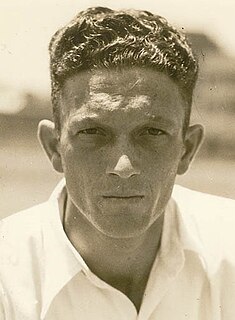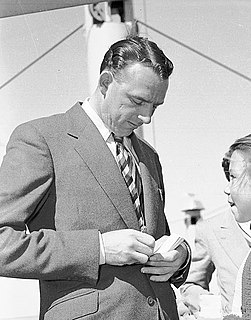Related Research Articles

James Charles Laker was an English professional cricketer who played for Surrey County Cricket Club from 1946 to 1959 and represented England in 46 Test matches. He was born in Shipley, West Riding of Yorkshire, and died in Wimbledon, London.

Frederick Sewards Trueman, was an English cricketer who played for Yorkshire County Cricket Club and the England cricket team. He had professional status and later became an author and broadcaster.

Derek Shackleton was a Hampshire and England bowler. He took over 100 wickets in 20 consecutive seasons of first-class cricket, but only played in seven Tests for England. As of 2007, he has the seventh-highest tally of first-class wickets, and the most first-class wickets of any player who began his career after World War II. He holds the record for the most first-class wickets taken by any Hampshire player.

William Eric Bowes was an English professional cricketer active from 1929 to 1947 who played in 372 first-class matches as a right arm fast bowler and a right-handed tail end batsman. He took 1,639 wickets with a best performance of nine for 121 and completed ten wickets in a match 27 times. He scored 1,531 runs with a highest score of 43* and is one of very few major players whose career total of wickets taken exceeded his career total of runs scored. He did not rate himself as a fielder but he nevertheless held 138 catches.

David Leslie Bairstow was an English cricketer, who played for Yorkshire and England as a wicket-keeper. He also played football for his hometown club Bradford City. He is the father of England international cricketer Jonny Bairstow.

Christopher Mark Wells Read is an English former cricketer who was the captain of Nottinghamshire County Cricket Club. He played for the England cricket team in 15 Tests and 36 ODIs. He was a wicket-keeper.

Donald Tallon was an Australian cricketer who played 21 Test matches as a wicket-keeper between 1946 and 1953. He was widely regarded by his contemporaries as Australia's finest ever wicket-keeper and one of the best in Test history, with an understated style, an ability to anticipate the flight, length and spin of the ball and an efficient stumping technique. Tallon toured England as part of Don Bradman's Invincibles of 1948 and was recognised as one of the Wisden Cricketers of the Year in 1949 for his performances during that season. During his Test career, Tallon made 58 dismissals comprising 50 catches and 8 stumpings.

Robert Appleyard was a Yorkshire and England first-class cricketer. He was one of the best English bowlers of the 1950s, a decade which saw England develop its strongest bowling attack of the twentieth century. Able to bowl fast-medium swingers or seamers and off-spinners with almost exactly the same action, Appleyard's career was almost destroyed by injury and illness after his first full season in 1951. In his limited Test career, he took a wicket every fifty-one balls, and in first-class cricket his 708 wickets cost only 15.48 runs each.

Chris Old is a former English cricketer, who played 46 Tests and 32 ODIs from 1972 to 1981. A right-arm fast-medium bowler and lower order left-handed batsman, Old was a key feature of the Yorkshire side between 1969 and 1983, before finishing his career at Warwickshire in 1985. As a Test bowler for England he took 143 wickets, and scored useful runs in the famous 1981 Ashes series' Headingley victory.
Arthur Dolphin was an English first-class cricketer, who kept wicket for Yorkshire County Cricket Club between 1905 and 1927. He is part of a tradition of Yorkshire wicket-keepers, stretching from Ned Stephenson, George Pinder, Joe Hunter and David Hunter before him, to Arthur Wood, Jimmy Binks, David Bairstow plus Richard Blakey to the present day. The successor to David Hunter as Yorkshire's wicket-keeper he served the county for twenty two years.
Donald Vincent Brennan was an English cricketer, who played in two Tests in 1951. For his county Yorkshire he was their regular wicket-keeper between 1947 and 1953, taking a total of 380 dismissals in those seven seasons. A poor batsman, he averaged 10.52 in first-class cricket with only a single fifty in 232 appearances. Cricket correspondent, Colin Bateman, noted after Brennan had replaced Godfrey Evans in the England cricket team, that "there can be few higher tributes to his 'keeping skills than that".
1968 was the 69th season of County Championship cricket in England and it was something of a watershed for it was the last in which the County Championship predominated. From 1969, a new limited overs league began and the number of Championship matches was therefore reduced. A system of batting and bowling bonus points was introduced into the County Championship, replacing the long- established "first innings points". The season was a watershed for Yorkshire too as, although they won their third successive championship title, the team broke up at the end of the season. The great fast bowler Fred Trueman retired and, following a stalemate in his contractual talks, Ray Illingworth left the club. Yorkshire did not win the title again until 2001. England and Australia drew the Test series with one win apiece so Australia retained the Ashes.
Peter May captained the English cricket team in Australia in 1958–59, playing as England in the 1958-59 Ashes series against the Australians and as the MCC in their other matches on the tour. It was widely regarded as one of the strongest teams to depart English shores, comparable with the great teams of Johnny Douglas in 1911-12 and Percy Chapman in 1928-29. It had no obvious weaknesses, and yet it was beaten – and beaten badly. By the First Test the top batsmen had made runs, the Surrey trio of Loader, Laker and Lock had taken wickets, as had Lancashire's Brian Statham. South Australia, Victoria and an Australian XI had all been beaten – the last by the crushing margin of 345 runs – and all seemed rosy for Peter May's touring team. But in the Brisbane Test they lost by 8 wickets and the rest of the series failed to offer any hope of reversing their fortunes. The reasons for their failure were manifold; the captain was too defensive; injuries affected their best players; others were too young and inexperienced such as Arthur Milton, Raman Subba Row, Ted Dexter, Roy Swetman and John Mortimore, or at the end of their career; Godfrey Evans, Trevor Bailey, Jim Laker, Willie Watson and Frank Tyson. Their morale was further bruised when faced with bowlers of dubious legality and unsympathetic umpires. Peter May was criticised for seeing his fiancée Virginia Gilligan, who was travelling with her uncle the Test Match commentator Arthur Gilligan. The press blamed the poor performance on the team's heavy drinking, bad behaviour and lack of pride – a foretaste the treatment losing teams would receive in the 1980s. It was not a happy tour by any means and it would take 12 years to recover The Ashes. As E.W. Swanton noted
It was a tour which saw all sorts of perverse happenings – from an injury list that never stopped, to the dis-satisfaction with umpiring and bowlers' actions that so undermined morale. From various causes England gave below their best...

The England cricket team toured Australia and New Zealand between October 1962 and March 1963 with a one-match stopover in Colombo, en route to Australia. The tour was organised by Marylebone Cricket Club (MCC) and, in all matches other than Tests, the team was called MCC. In Australia, the tour itinerary consisted of 15 first-class matches, including the five-match Test series against Australia in which The Ashes were at stake.
1962 was the 63rd season of County Championship cricket in England.
Roy Booth was an English first-class cricketer, who played for both Yorkshire and Worcestershire. He was born at Marsden, West Riding of Yorkshire.

Don Tallon was a key member of Donald Bradman's famous Australian cricket team tour of England in 1948, in which Australia was undefeated in their 34 matches. This unprecedented feat by a Test side touring England earned them the sobriquet The Invincibles.
Alan Kenneth Armitage is an English former first-class cricketer. Armitage was a right-handed batsman who occasionally fielded as a wicket-keeper. He was born at Nottingham, Nottinghamshire.
Kent County Cricket Club's 1909 season was the twentieth season in which the County competed in the County Championship. Kent played 30 first-class cricket matches during the season, losing only two matches overall, and won their second Championship title. They finished clearly ahead of second place Lancashire in the 1909 County Championship with the previous years winners Yorkshire in third place.
References
- 1 2 Warner, David (2011). The Yorkshire County Cricket Club: 2011 Yearbook (113th ed.). Ilkley, Yorkshire: Great Northern Books. p. 363. ISBN 978-1-905080-85-4.
- ↑ "Jimmy Binks". Cricketarchive.com. Retrieved 27 March 2011.
- 1 2 Bateman, Colin (1993). If The Cap Fits. Tony Williams Publications. p. 21. ISBN 1-869833-21-X.
- ↑ "Another India-Australia thriller". ESPNcricinfo. 5 October 2017. Retrieved 9 October 2017.
- ↑ Fred Trueman. As It Was. MacMillan. p. 213. ISBN 978-1405041485.